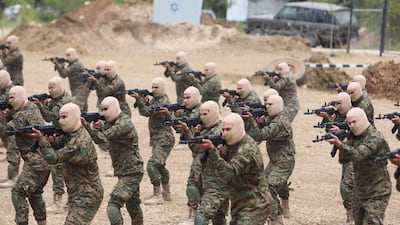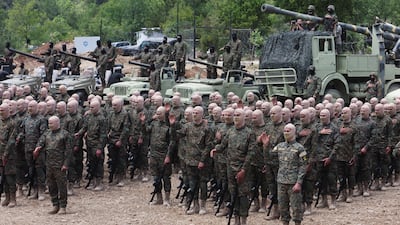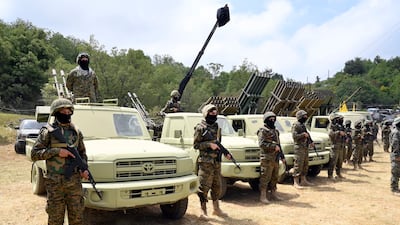Hezbollah Secretary General Hassan Nasrallah has said Lebanese politicians are all waiting for the September return of Jean-Yves Le Drian, France's special envoy to Beirut, and his proposed initiative to end Lebanon's presidential deadlock.
The head of the powerful Iran-backed armed group and political party said that "opening the door" to "serious dialogue" could help find a way to ending an impasse that has lasted since October last year.
"It is also clear that everyone will wait for September for the return of the French envoy and his initiative that he talks about," Mr Nasrallah said in a speech to his supporters as the Ashoura remembrance period came to an end.
He also reiterated his criticism of Hezbollah's parliamentary rivals, accusing unnamed "political forces" of rejecting cross-party dialogue.
Lebanon's deeply divided 128-seat parliament has failed on 12 occasions to elect a successor to Michel Aoun, who left the presidential palace in Baabda at the end of last October.
Mr Le Drian, the former French foreign minister who was recently appointed special envoy to Lebanon by President Emmanuel Macron, has conducted two visits to the country in recent months.
He has often been outspoken in his criticism of the elites, whom he accuses of foot dragging in carrying out vital economic and political reforms requested by the EU and IMF to unlock aid and bailout funds.
His most recent visit was conducted this week, where he met politicians from all sides, including Hezbollah.
"He proposed to all those taking part in the process of electing a president to invite them to a meeting in Lebanon in September to achieve a consensus on the challenges and on the priority projects the future president will have to carry out, and consequently the qualities necessary for tackling them," the French Foreign Ministry said.
"The goal of the meeting is to create a climate of trust and enable Parliament to meet subsequently amid conditions favourable to the holding of an open ballot, in order to solve the crisis quickly."
Former colonial power France is one of a number of countries that have taken a leading role in trying to end the impasse.
Hezbollah, an arch foe of Israel, was the only civil war militia allowed to retain its weapons following a 1989 peace agreement. Its opponents accuse it of maintaining a stranglehold over Lebanon.
In Lebanon's unique confessional system, the presidency is reserved for a Maronite Christian, the premiership for a Sunni Muslim, and the post of speaker of parliament for a Shiite Muslim.
Elite roadblock
In his Sunday service Lebanon's top Maronite cleric Bechara Al Rai hit out at MPs over the impasse, asking if anyone "could explain to us why Parliament has not yet elected a new president?"
He also asked why a dialogue over Lebanon's head of state was delayed until September, especially given the precarious status Lebanon finds itself in.
"Is it because of the August holidays of the [MPs] - for leisure at sea, in the mountains and travel - when people are dying of hunger and the state is plagued by chaos?" Mr Al Rai said.
In the presidential race, Hezbollah and its Shiite ally Amal - led by powerful long-time parliamentary speaker Nabih Berri - have thrown their support behind Suleiman Frangieh, a close friend of Syria's Bashar Al Assad.
But Mr Frangieh, the scion of an influential north Lebanese Maronite Christian, has been unable to court the vote of barely any Christian MPs.
Lebanon's main Christian parties in the most recent round of voting formed a rare "convergence" behind International Monetary Fund official Jihad Azour.
Nonetheless, neither has come close to hitting the necessary threshold required to become the country's head of state.













